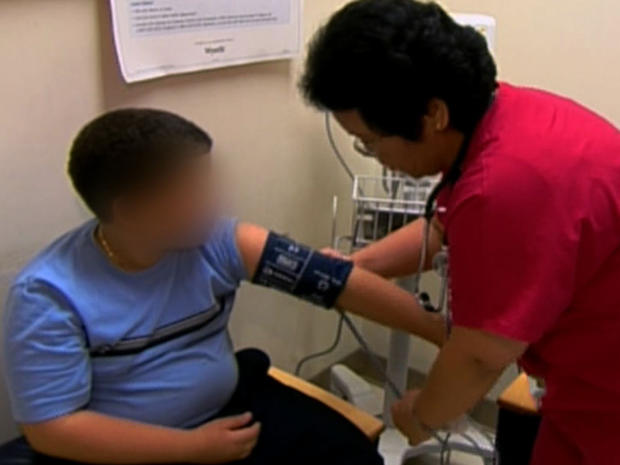American Medical Association wants obesity education taught in schools, soda taxes
(CBS/AP) The American Medical Association wants schools to include a yearly curriculum aimed at preventing obesity for public school kids and teens.
Childhood obesity genes identified, scientists say
Ga. childhood obesity PSAs spark controversy
PICTURES: Oops! 8 ways parents make kids fat
The nation's largest professional society of doctors agreed to support legislation that would require classes that taught the causes, consequences and prevention of obesity for first through 12th graders. Doctors will be encouraged to volunteer their time to help with that under the new policy adopted on the final day of the AMA's annual policymaking meeting.
Doctors at the meeting shared sobering statistics and personal stories in urging the AMA to sharpen its focus on obesity prevention.
"I can't tell you the number of 40-pound 1-year-olds I see every day," Dr. Melissa Garretson, a Stephensville, Texas pediatrician, told the delegates before Wednesday's vote. She said requiring obesity education "is a great idea."
The measure was drafted by the AMA's Pennsylvania delegation. It cited data showing that more than 300 million people worldwide are obese and said requiring nutrition education to prevent obesity has never been proposed.
More than one-third of U.S. adults and almost one in five children (12 million kids) in the U.S. are obese. A recent CDC study in January suggests those numbers finally may have stabilized, but doctors say that's small consolation when so many people are still too fat.
Excess weight is strongly linked with diabetes, heart disease and some cancers, and weight loss of just 5 percent can help improve health, the Pennsylvania doctors' measure said.
According to the CDC, obese children in particular are more likely to have high blood pressure and cholesterol which may contribute to future heart problems, breathing problems such as sleep apnea and asthma, joint problems and pain, fatty liver disease, gastro-esophageal reflux (GERD), and social and psychological issues like poor self-esteem which can carry through adulthood.
Dr. Bruce Wilder, a delegation member, said he will ask Pennsylvania legislators to introduce legislation to enact that requirement in schools.
On Wednesday the American Medical Association also adopted an obesity policy which supports taxes on sugar-sweetened beverages, using revenue to fund obesity education for consumers. The AMA says sugar-sweetened drinks comprise about half of American's added sugar intake, so reducing consumption of the beverages is a "simple way" to cut sugar and empty calories.
"Where taxes are implemented on sugar-sweetened beverages, using revenue for anti-obesity programs and educational campaigns explaining the adverse effects of excessive consumption of these beverages will help to reduce the consumption of these caloric beverages and improve public health," AMA board member Dr. Alexander Ding, said in a press release.
But the AMA stopped short of a full-fledged endorsement. Some doctors think soda taxes would disproportionately hurt the poor and disadvantaged. Others said taxes shouldn't be used to force people to make healthful decisions they should be making on their own.
The beverage industry responded to the AMA's proposal in a statement.
"The intention of the American Medical Association to seek ways to help reduce overweight and obesity in America is an admirable goal that our industry fully supports," the American Beverage Association said in a statement. "However, funding anti-obesity programs through discriminatory taxes on sugar-sweetened beverages is misguided.... The body of science proves, and real world evidence demonstrates, that taxes on sugar-sweetened beverages will not have a meaningful impact on obesity."
In other action at the meeting, the AMA voted to:
- Urge online social networks to adopt bans on cyber-bullying, or "electronic aggression," on their sites.
- Work to reduce suicide among gay, lesbian, bisexual and transgender teens by partnering with public health and policy groups addressing the problem.
- Encourage state and local drug courts as an alternative to incarceration for nonviolent criminals.
